How to Fix Window Stuck on Prepare to Configure Windows Error
The "Preparing to configure Windows" message appears on your Windows PC while a new update is being installed or the user is performing a clean installation of Windows. This issue is triggered due to corrupted or missing files or some disk errors.
If you are facing this issue on Windows 11 PC, please continue reading this article. Here, we have listed some methods that can help you resolve Windows stuck on"Prepare to configure Windows" loop.
Method 1 – Repair Corrupted System FilesStep 1.Restart your computer and press the F11 key repeatedly on your keyboard until the "Advanced Startup" screen opens. The above keys can be changed from one manufacturer to another. If you are unable to find out the key, you can go to the advanced startup screen as mentioned in this article.
Step 2. In
Repair Mode,Select Troubleshooting -> Advanced Options.
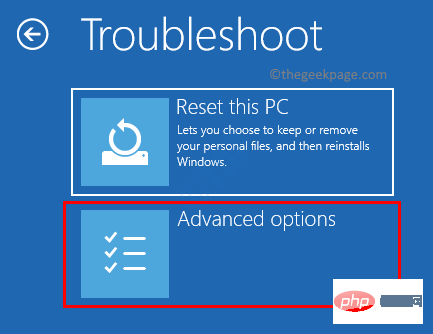 Step 3. On the
Step 3. On the
page, select Command Prompt.
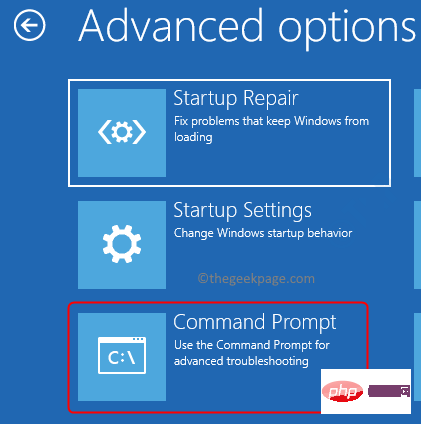 Step 4. Type the following command and press
Step 4. Type the following command and press
BCDEDIT
Execute the following commands.
sfc /scannow /offbootdir=:\ /offwindir=:\windows
Replace with the drive letter where Windows is installed.
DISM /Online /Cleanup-Image /RestoreHealth
Step 7. Finally, run the
Chkdsk utility using the following commandchkdsk [drive_letter] /f /r /x
Replace [drive_letter] with the one you have installed Windows drive letter. Step 8.
Restart the computerand check if the problem is resolved. These utilities will scan your system files for any inconsistencies and attempt to resolve problems caused by these inconsistent system files.
Method 2 – Wait for all Windows updates to be installed
While installing and configuring updates on your PC, your system may get stuck at the
“Preparing to configure Windows” screen superior. If a long time has passed since you performed a Windows Update, it may take more time than usual to install all updates.So, you need to wait for some time so that your Windows PC can install all the updates. You may need to wait approximately 2 hours for the update to fully install based on your PC's hardware specifications. During this process, if the update gets stuck on the screen and takes more than 2 hours, then move on to the next method.
Method 3 – Perform a Hard Reset of WindowsStep 1. Turn off the computer by holding down the power button until the system shuts down. Step 2. If you have any external power sources, disconnect them, or in the case of a laptop, you can remove the battery. Step 3. Now, press and hold the power button for 15 seconds. Step 4. After waiting for some time, connect the power supply to the PC or put back the laptop battery. Step 5. Press the power button to restart the system. Step 6. If you see a notification that the system did not shut down gracefully, select the option to restart gracefully. After logging in to your Windows PC, try following the steps mentioned below to perform Windows updates. step 1. PressWindows R
to open"Run". Step 2. Type ms-settings:windowsupdate
and pressEnter.
Step 3. On the 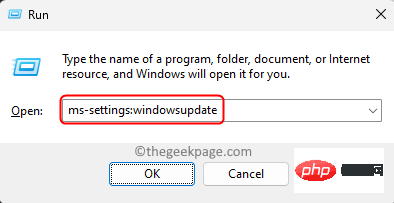 Windows
Windows
Check for Updates button.
Step 4. Wait for Windows to download and install any updates available for your PC. 
Restart your
PC and check if it's still stuck onPreparing to configure Windows . Generally, it's best to plug in your computer and allow it to configure updates throughout the night. If your PC is still stuck after overnight, perform a hard reboot and move on to the next fix.
Method 4 – Perform a Clean BootStep 1. Use theWindows
R key combination on your keyboard to open the Run dialog box. Step 2. Type msconfig
and press theEnter key to open the system configuration.
Step 3. Go to the "Service" tab.
In the lower left corner, check the box next to Hide all Microsoft services.
Then, click the Disable All button in the lower right corner.
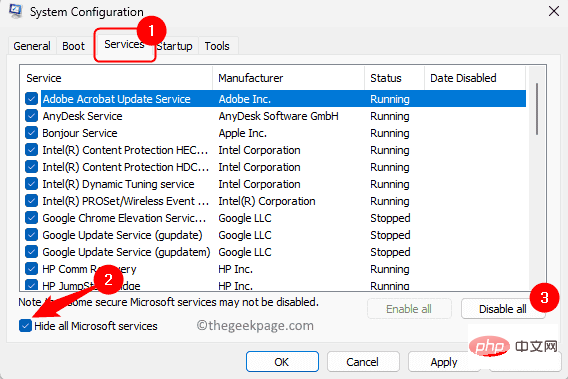
Step 4. Select the"Launch" tab.
Now, click on the Open Task Manager link.

Step 5. This will open Task Manager on its "Startup" tab.
Here, for each program in startup, select it and click the "Disable" button.
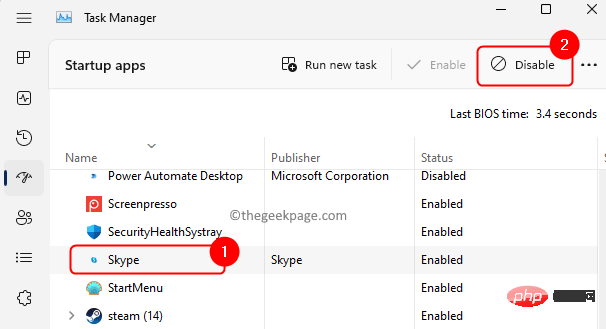
Step 6. Close the Task Manager and return to the "System Configuration" window.
Step 7. Click "Apply" and then click "OK".
You will be prompted to restart your system to apply the changes. Here, click Restart.
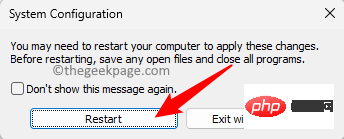
Step 8. After the system restarts, try performing the Windows updates mentioned in the above fixes.
Step 9. Once the computer has restarted after the system update, if your computer is not stuck, return to the System Configuration window and enable the services you previously disabled one at a time.
Enable each service in the list to check for problematic services and then restart.
If you still see the problem after this, then the only option is System Restore.
Method 5 – Using System Restore
Step 1. Press Windows R to open "Run".
Step 2. Type rstrui and press Enter to open the System Restore window.
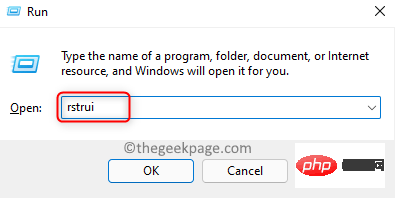
Step 3. In the SystemRestore window, click Next to select a restore point.
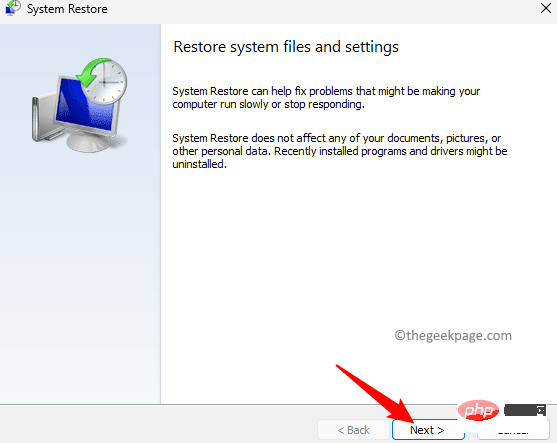
If you see any options on this screen, select Choose a different restore point and click Next .
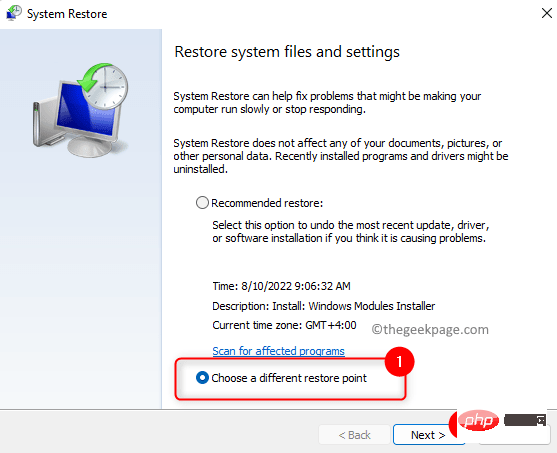
Step 4. From the list that appears, select a restore point that was created before you encountered this problem.
Click Next to continue the restore.
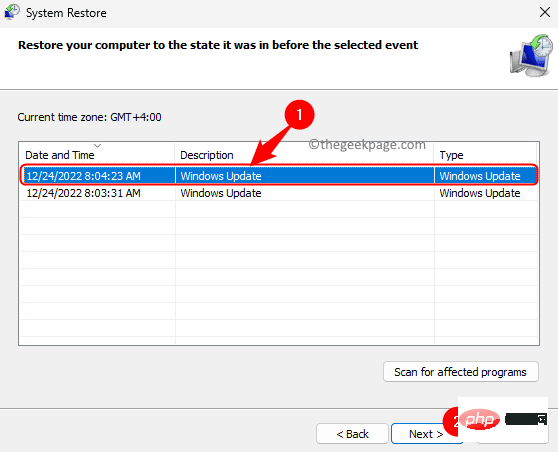
Step 5. Details of the restore point are displayed. To confirm the restore point, click Finish.
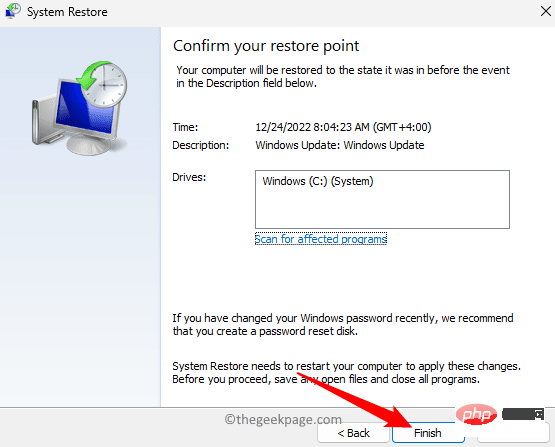
Step 6. Click "Yes" to confirm the restore process.
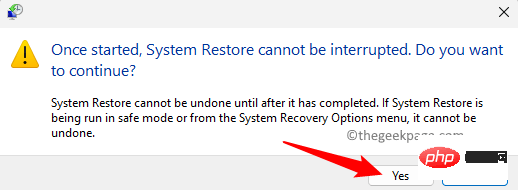
Step 7. Windows will now restart and start restoring your PC.
Wait for it to complete.
After the system starts, check whether the screen stuck problem has been resolved.
If you are unable to log in to Windows to perform a system restore, please follow the steps below.
Step 1.Restart the system and continuously press the F11 key during startup.
If you are unable to do this, click here and follow this method.
Step 2. You will see the Advanced Recovery Options screen.
Here, click Troubleshoot.
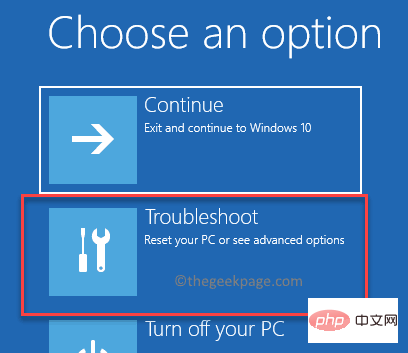
Step 3. Select the Advanced options on this page.

Step 4. Select "System Restore" and it will open the "System Restore" window for you.
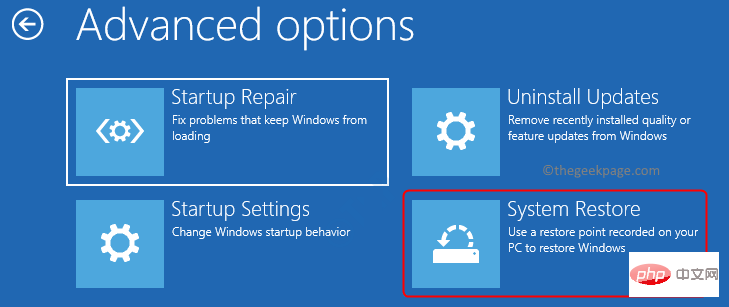
Select a restore point and follow the on-screen instructions to perform a system restore.
Step 5. After the restore is complete, check if the problem has been fixed.
If none of these methods work for you, perform a clean installation of your Windows PC.
The above is the detailed content of How to Fix Window Stuck on Prepare to Configure Windows Error. For more information, please follow other related articles on the PHP Chinese website!

Hot AI Tools

Undresser.AI Undress
AI-powered app for creating realistic nude photos

AI Clothes Remover
Online AI tool for removing clothes from photos.

Undress AI Tool
Undress images for free

Clothoff.io
AI clothes remover

Video Face Swap
Swap faces in any video effortlessly with our completely free AI face swap tool!

Hot Article

Hot Tools

Notepad++7.3.1
Easy-to-use and free code editor

SublimeText3 Chinese version
Chinese version, very easy to use

Zend Studio 13.0.1
Powerful PHP integrated development environment

Dreamweaver CS6
Visual web development tools

SublimeText3 Mac version
God-level code editing software (SublimeText3)

Hot Topics
 What is the reason why PS keeps showing loading?
Apr 06, 2025 pm 06:39 PM
What is the reason why PS keeps showing loading?
Apr 06, 2025 pm 06:39 PM
PS "Loading" problems are caused by resource access or processing problems: hard disk reading speed is slow or bad: Use CrystalDiskInfo to check the hard disk health and replace the problematic hard disk. Insufficient memory: Upgrade memory to meet PS's needs for high-resolution images and complex layer processing. Graphics card drivers are outdated or corrupted: Update the drivers to optimize communication between the PS and the graphics card. File paths are too long or file names have special characters: use short paths and avoid special characters. PS's own problem: Reinstall or repair the PS installer.
 How to speed up the loading speed of PS?
Apr 06, 2025 pm 06:27 PM
How to speed up the loading speed of PS?
Apr 06, 2025 pm 06:27 PM
Solving the problem of slow Photoshop startup requires a multi-pronged approach, including: upgrading hardware (memory, solid-state drive, CPU); uninstalling outdated or incompatible plug-ins; cleaning up system garbage and excessive background programs regularly; closing irrelevant programs with caution; avoiding opening a large number of files during startup.
 How to solve the problem of loading when PS is always showing that it is loading?
Apr 06, 2025 pm 06:30 PM
How to solve the problem of loading when PS is always showing that it is loading?
Apr 06, 2025 pm 06:30 PM
PS card is "Loading"? Solutions include: checking the computer configuration (memory, hard disk, processor), cleaning hard disk fragmentation, updating the graphics card driver, adjusting PS settings, reinstalling PS, and developing good programming habits.
 Is slow PS loading related to computer configuration?
Apr 06, 2025 pm 06:24 PM
Is slow PS loading related to computer configuration?
Apr 06, 2025 pm 06:24 PM
The reason for slow PS loading is the combined impact of hardware (CPU, memory, hard disk, graphics card) and software (system, background program). Solutions include: upgrading hardware (especially replacing solid-state drives), optimizing software (cleaning up system garbage, updating drivers, checking PS settings), and processing PS files. Regular computer maintenance can also help improve PS running speed.
 How to solve the problem of loading when the PS opens the file?
Apr 06, 2025 pm 06:33 PM
How to solve the problem of loading when the PS opens the file?
Apr 06, 2025 pm 06:33 PM
"Loading" stuttering occurs when opening a file on PS. The reasons may include: too large or corrupted file, insufficient memory, slow hard disk speed, graphics card driver problems, PS version or plug-in conflicts. The solutions are: check file size and integrity, increase memory, upgrade hard disk, update graphics card driver, uninstall or disable suspicious plug-ins, and reinstall PS. This problem can be effectively solved by gradually checking and making good use of PS performance settings and developing good file management habits.
 Is PS slow loading related to other programs that are running?
Apr 06, 2025 pm 06:03 PM
Is PS slow loading related to other programs that are running?
Apr 06, 2025 pm 06:03 PM
The secrets to mastering Office software include: understanding different versions and platforms, correctly installing and configuring, proficient in using the software interface, in-depth understanding of feature operations, application collaboration and sharing functions, utilizing templates and styles, mastering advanced skills, and solving common problems. In addition, you need to choose a version that suits your needs, make good use of templates and styles, develop backup habits, and learn shortcut keys and advanced techniques to improve efficiency.
 Does mysql need the internet
Apr 08, 2025 pm 02:18 PM
Does mysql need the internet
Apr 08, 2025 pm 02:18 PM
MySQL can run without network connections for basic data storage and management. However, network connection is required for interaction with other systems, remote access, or using advanced features such as replication and clustering. Additionally, security measures (such as firewalls), performance optimization (choose the right network connection), and data backup are critical to connecting to the Internet.
 How to solve the problem of loading when PS is started?
Apr 06, 2025 pm 06:36 PM
How to solve the problem of loading when PS is started?
Apr 06, 2025 pm 06:36 PM
A PS stuck on "Loading" when booting can be caused by various reasons: Disable corrupt or conflicting plugins. Delete or rename a corrupted configuration file. Close unnecessary programs or upgrade memory to avoid insufficient memory. Upgrade to a solid-state drive to speed up hard drive reading. Reinstalling PS to repair corrupt system files or installation package issues. View error information during the startup process of error log analysis.





